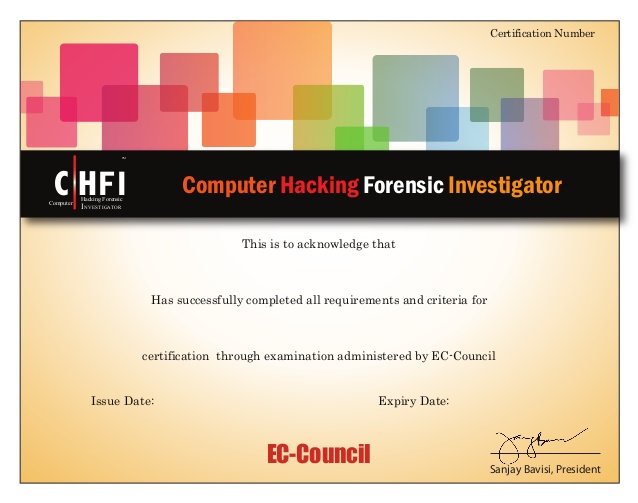
Trusted Cybersecurity Services. World-Class Training. Real-World Impact.
Train Your Team: Get Quote
Computer Hacking Forensic Investigation (C|HFI) is a vendor-neutral training certification devised by the EC Council. The C|HFI certification program helps security professionals stay ahead of the curve with extensive knowledge of detecting and investigating cyberattacks and exploiting all crucial evidence to support the investigation reports. Our C|HFI certification training is a well-crafted course designed to provide you with a holistic learning experience of C|HFI and effectively train you to achieve this certification.

You'll receive an official certificate upon successful course completion.
Computer Hacking Forensic Investigator (C|HFI) certification validates the expertise of security professionals in comprehensive computer forensics, including reporting incidents of cyber attacks and hacking attempts in the courts of law. C|HFI certification provides an extensive understanding of diverse cyber forensic techniques, ultra-modern forensic tools, evidence collection, and other critical elements required to perform thorough forensic investigations of hacking incidents, all with practical, hands-on experience.
This training is meticulously designed to expertly train the professionals intending to advance their careers as Forensic Investigators and execute their security roles and responsibilities with greater expertise. It offers practical insights into diverse, robust methodologies for addressing digital forensics concerns in the organization, constituting core fundamentals of security incidents, including infrastructure analysis and tools and techniques to identify and capture legal evidence against hackers and intruders.
Module 1: Computer Forensics in Today’s World
Labs:Create a Hard Disk Image File for Forensics Investigation and Recover the Data
Module 3: Understanding Hard Disks and File Systems
Labs:
Module 4: Data Acquisition and Duplication
Labs:
Module 5: Defeating Anti-Forensics Techniques
Labs:
Module 6: Windows Forensics
Labs:
Module 7: Linux and Mac Forensics
Labs:
Module 8: Network Forensics
Labs:
Module 9: Malware Forensics
Labs:
Module 10: Investigating Web Attacks
Labs:
Module 11: Dark Web Forensics
Labs:
Module 12: Cloud Forensics
Labs:
Module 13: Email and Social Media Forensics
Labs:
Module 14: Mobile Forensics
Labs:
Module 15: IoT Forensics
This course is ideal for:
Join the next generation of security professionals with our industry-leading training programs
Unfilled positions projected by 2025 across all industries
Financial impact for organizations without proper security
Companies hiring our graduates
Our certified professionals are sought after by leading organizations
Organizations prioritizing cybersecurity training
Increased training budgets
High demand for security professionals
High demand for security professionals
High demand for security professionals
High demand for security professionals
High demand for security professionals
High demand for security professionals